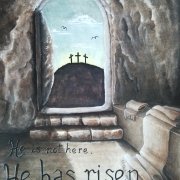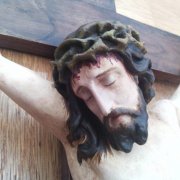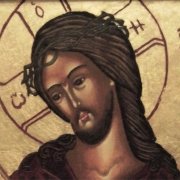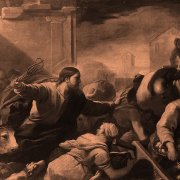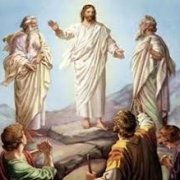“I saw Christ’s glory as He rose!”
EASTER SUNDAY
First Reading: Acts 10:34.37-43
Psalm: 117:1-2.16-17.22-23
Second Reading: Colossians 3:1-4
Gospel: John 20:1-9
“Tell us Mary: say what thou didst see upon the way.
The tomb of the living did enclose;
I saw Christ’s glory as He rose! […]
Christ, my hope, has risen […]
That Christ has risen from the dead we know.”
These verses are taken from the Victimae Paschali (Paschal Victim), the sequence that is said or sung on the Mass of Easter day, before the Gospel acclamation (and during the Octave of Easter).
The Victimae Paschali is an explosion of joy! Christ has risen: there is no reason to cry any more, no room for grief and despair. Yes, Jesus is the Lord indeed, everything He has said has been fulfilled. He is the Lamb of God who takes away the sins of the world by his sacrifice on the cross and his resurrection.
There are witnesses who saw all this. They know that they have spoken the truth and they have given this evidence so that today we may believe as well (cf. Jn 19:35): Mary of Magdala and the other women who went to the tomb on Easter morning; Peter and John, who ran there as fast as they could; the other apostles; the disciples of Emmaus and all those ones to whom our Lord appeared.
And this is the testimony on which Christian faith is built and stands firm: Christ is the Lord and He has risen! “If Christ has not been raised – says St Paul – your faith is pointless and you have not, after all, been released from your sins. […] In fact, however, Christ has been raised from the dead, as the first-fruits of all who have fallen asleep” (1 Cor 15:17.20), of those who have died.
In the first reading we see St Peter announcing the Good News to Cornelius, a pagan. He also says: “Now we are those witnesses – we have eaten and drunk with him after his resurrection” (Acts 10:41). Furthermore, Peter points out that “it is to him that all the prophets bear this witness: that all who believe in Jesus will have their sins forgiven through his name.” (Acts 10:43).
Jesus himself, appearing to the apostles on Easter evening tells them: “This is what I meant when I said, while I was still with you, that everything written about me in the Law of Moses, in the Prophets and in the Psalms, was destined to be fulfilled. […] So it is written that the Christ would suffer and on the third day rise from the dead, and that, in his name, repentance for the forgiveness of sins would be preached to all nations, beginning from Jerusalem. You are witnesses to this” (Jn 24:44.46-47).
From the Prophets on, during the centuries, there were men and women who believed and testified that Jesus Christ is the Son of God, that He died for our sake, was risen from the dead… He, the only one who has the power to forgive our sins!
What is more, there is an even greater testimony: “the deeds my Father has given me to perform, – said Jesus – these deeds of mine testify that the Father has sent me. Besides, the Father who sent me bears witness to me himself” (Jn 5:36).
What else do we need to believe?
Let then joy fill our hearts, in order to profess our faith with no fear and live out the mission that our risen Lord has entrusted to us: “Go out to the whole world; proclaim the Gospel to all creation” (Mk 16:15), because we are witnesses too! We bear the witness of the Church as well as our own testimony, that is precisely how we came to know God, and how we experienced him… his living and loving presence in our lives!
The apostles’ preaching was very bold: that is because of a strong awareness, rooted in their hearts by the power of the Holy Spirit: Christ is the Lord and He has risen from the dead!
“Something which has existed since the beginning, which we have heard, which we have seen with our own eyes, which we have watched and touched with our own hands, the Word of life – this is our theme. We are writing this to you so that our joy may be complete” (1 Jn 1:1.4).
May the Holy Spirit help us to tell of the wonders of God, by both words and deeds, with the same boldness of the apostles.
May the risen Lord fill our hearts with his joy, now and forever!
Christ, my hope, has risen
Alleluia!

